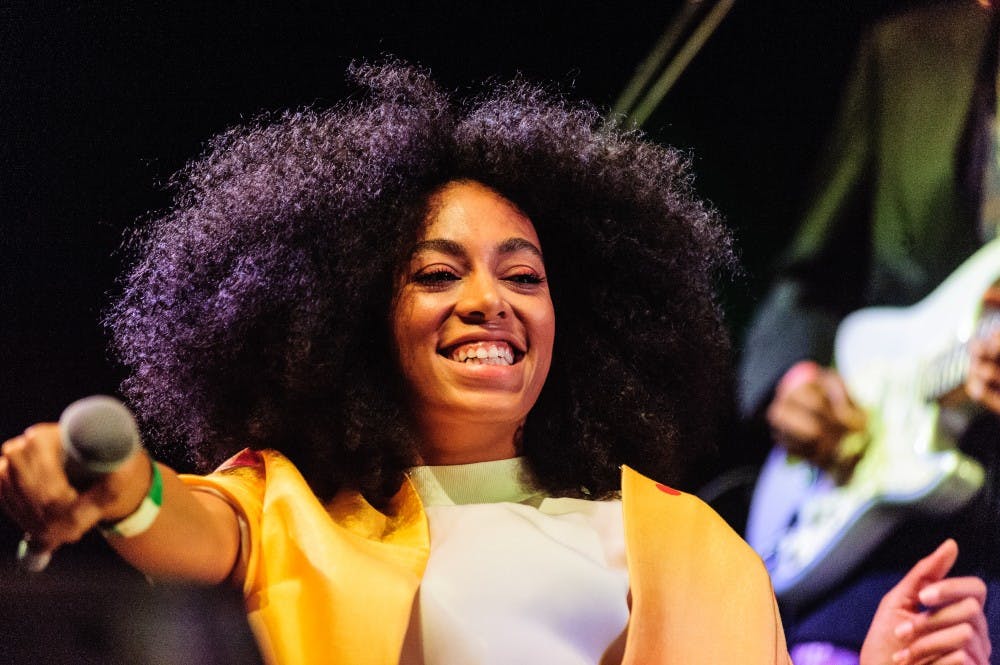The music video that will never fail to leave me visually stunned is that of Solange Knowles’ “Cranes in the Sky,” directed by Alan Ferguson and Knowles herself. I recall watching it as a senior in high school, replaying it over and over to take in the energy of the incredibly subtle but loud images.
To this day, I am still in awe of her work. While it has already been three long years since the release of her 2016 album A Seat at the Table, Knowles continues to claim her title in a special niche within the music world, where her transcendent artistry presents itself as more than just sound and visuals but, rather, an experience.
This time around, When I Get Home is a very specific experience that takes from Solange’s memories of community and belonging as a tribute to her hometown, Houston.
When I Get Home was dropped on Friday, March 1 as a 19-track album featuring countless artists including Playboi Carti, Blood Orange, Pharrell, Earl Sweatshirt, Gucci Mane, Tyler the Creator and Panda Bear, among many others.
In conjunction with the album, Solange released a film, also titled When I Get Home, exclusively on Apple Music. I am unfortunately an avid Spotify user, but she has also integrated countless other visuals on Spotify, where, instead of the superimposed, motionless album cover on each title screen of the track, you get snippets from the film in short gif-like clips that repeat above a trail of moving numbers.
This feature, which I have never seen before, allows you to simultaneously experience the song and the authority she claims in the execution of her creative process.
The album cover of When I Get Home is slightly reminiscent of A Seat at the Table, where Solange’s iconic blue and pink hair pins are constant reminders of her hit track, “Don’t Touch My Hair,” where she takes prideful ownership of black culture and her own self in the lyrical sequence, “Don’t touch my hair / When it’s the feelings I wear / Don’t touch my soul / When it’s the rhythm I know / Don’t touch my crown / They say the vision I’ve found / Don’t touch what’s there / When it’s the feelings I wear.”
In the same way that Knowles presents introspections of her own self in A Seat at the Table, this time, she returns with ethereal insights into the faint recollections of her distant memories in the opening track, “Things I Imagined” and the dreams she grew up with as a little girl in the aptly titled “Dreams.”
At different points in the album, we get short 20-second interludes before she jumps right back into darker confessions about her fears, as she does in the 10th track, “Time (is).” Once again, we cannot ignore her pronounced messages about embracing her blackness in tracks like “My Skin My Logo,” not to mention the black female representation she incorporates in her film. It is powerful, it is beautiful and it creates an impenetrable dimension that can, to a certain extent, only be fully comprehended by the artist. Before anything, the album is for Solange Knowles herself.
In a promotional post on Instagram under her handle “saintrecords” and a location tag marked Houston, she expressed her thanks to all her viewers and fans.
“Thank you for always giving me the space to expand and evolve and express. For constantly opening up my world, and allowing me to show you my own new ones. I express for survival, for breath. This shit gave me so much joy to make! I wasn’t afraid. My body wasn’t either, even at times of uncertainty. I love and appreciate u guys infinitely. You make me feel safe and held even in this big big strange world. I can’t thank you enough. It’s been hard to answer where home is, hard to know if it’s past or future... this album and film is one stream of thought and reflection into answering that.”
Past or future, I can only say that Knowles’ work is a timeless creation, one that people will come back to when coming across their own unanswered questions about identity and belonging. In fact, by the very last track, “I’m a Witness,” Solange provides consoling words for everyone listening, uttering the following words, “You can work through me / You can say what you need in my mind / I’ll be your vessel / I’ll do it every time / And I won’t stop ‘til I get it right / Good night / Takin’ on the, takin’ on the light.”





